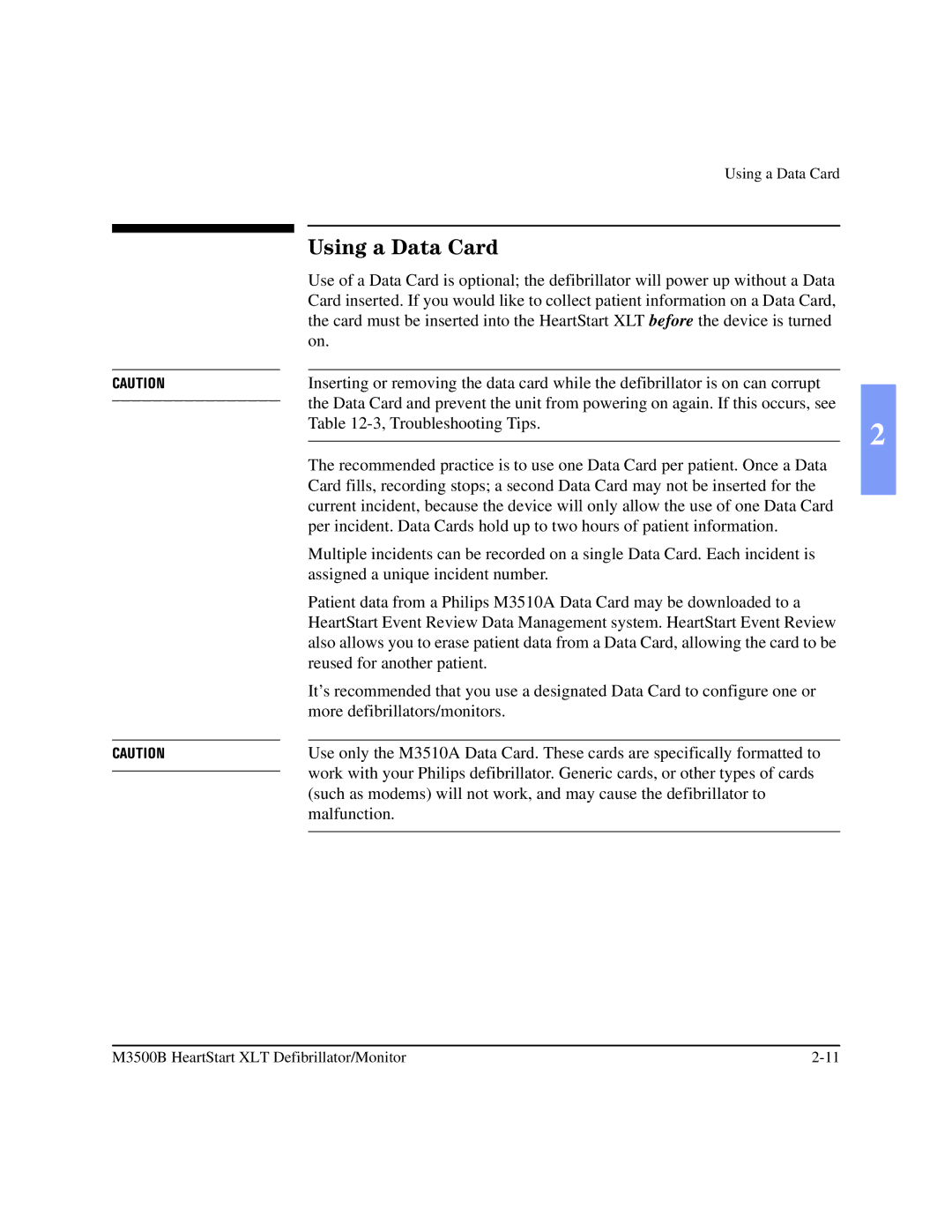A R TS TA R T X LT
Page
Instructions for Use
1RWLFH
Conventions
Page
Contents
Monitoring the ECG
Defibrillating in AED Mode
Monitoring SpO2
Storing, Retrieving & Printing
Defibrillating in Manual Mode
Performing Synchronized Cardioversion
Pacing
Maintaining the HeartStart XLT
Setting Up and Configuring the HeartStart XLT
Troubleshooting
Specifications & Safety
Overview
Introduction
Overview
Defibrillation Therapy
Intended Use
Indications for AED Therapy
Contraindications for AED Therapy
Precautions for AED Therapy
Indications for Manual Defibrillation Therapy
Indications
Precautions for Manual Defibrillation Therapy
Noninvasive Pacing Therapy
Contraindications for Manual Defibrillation Therapy
SpO2 Monitoring
Learning to Use the HeartStart XLT
Safety Considerations
Page
Getting Acquainted
Getting Started
Basic Orientation
Basic Orientation
Audiovisual Controls
Manual Mode Controls
Manual Mode Controls
Manual Mode
User Message
AED Mode Display Layout ECG and SpO2 disabled
User Message 114J
132
150J
LCD Backlight
Manual Mode Display Layout
Inserting the Battery
Connecting to Power
Low Battery Warning
Removing the Battery
Using a Data Card
Inserting a Data Card
Inserting a Data Card
Removing a Data Card
Page
Defibrillating in AED Mode
AED Mode Overview
Defibrillation with the default configuration
Defibrillation with a modified configuration
Preparation
Connecting Pads to the Patient Cable
Press On
Defibrillating
Connect Pads Cable
Apply Pads Display
Apply Pads
Check Patient If No Pulse Press Analyze Shocks
If instructed, press $1$/=
Analyzing Do Not Touch Patient
97J
Charging to 150J
Press Shock
If shock advised, press 6+2
150J
Stand Clear
Shock Delivered
Automatic Re-analysis On
If Needed Press Pause Begin CPR Shocks
Pausing for CPR
11 Pause Display
Paused Timer 21
Monitoring Rhythm
Monitoring Rhythm
This prompt is repeated periodically, as configured, until
ERC Protocol
Paused
Timer 35 / 60
AED Mode Prompts
Troubleshooting
Prompt Possible Cause Corrective Action
Monitoring the ECG
Applying Monitoring Electrodes
Lead Reference
Electrode Placement
5-Lead ECG Lead Formation
Precordial Lead Electrode Placement
Selecting the Lead
Lead Select If Configured for a Choices are
Lead Select Choices
HR Alarm Limit Choices
Setting the Heart Rate Alarm
Alarm If Over Or under
Situation Cause Solution
Disabling the HR Alarm
Adjusting the ECG Size
Troubleshooting Tips
RFI
Acquired while monitoring, see Chapter
Monitoring SpO2
Pulse Oximetry Sensor
Understanding Pulse Oximetry
Approved Sensors
Selecting a Sensor
Sensor Type Patient Patient Size Ideal Site
Disposable Sensors
Reusable Sensors
Semi-disposable Sensors
Applying the Sensor
Connecting the Sensor Cable
Connecting the Sensor Cable
SpO2 Monitoring Display
Monitoring
Responding to an Alarm
Setting Alarms
Caring for Sensors
Discontinuing SpO2 Monitoring
System Messages
Problem or Message Possible Cause Corrective Action
6S2&DEOH2II
Page
Defibrillating in Manual Mode
Enter Password
Enabling Manual Mode
Preparation
150 J
Select Energy
Charge
Shock
150 J 87 J
Returning to AED Mode
Performing Synchronized Cardioversion
Delivering a Synchronized Shock
Preparing for Synchronized Cardioversion
Sync
Delivering Additional Synchronized Shocks
Disabling Sync Mode
Pacing
Monitoring During Pacing
Demand Mode Versus Fixed Mode
Preparing for Pacing
Pacing
Pacer Stop Demand Mode 70ppm 30mA
Pacing Demand Mode 70ppm 30mA
Defibrillating During Pacing
Changing Pacing Modes
Message Possible Cause Corrective Action
Pacing System Messages
Page
Storing, Retrieving & Printing
Annotations
Marking Events
Event Information
Events Recorded
Event Related Information Stored
ECG waveform with annotation , Epi
Patient Record Summary
Creating a Patient Record
Then
Event Summary
Printing the Internal Event Summary
Event Waveform Description
Event Waveform Information
Printing Events
Event Real-Time Delayed Strip Length
Printing Events
Connecting/Disconnecting Patient Cables
Setting Up and Configuring the HeartStart XLT
Pads Patient Cable Connector
Connecting the Pads Patient Cable
Disconnecting the Pads Patient Cable
Disconnecting the Pads Patient Cable
Disconnecting the ECG Patient Cable
Connecting the ECG Patient Cable
Disconnecting the SpO2 Patient Cable
Connecting the SpO2 Patient Cable
Recommended Accessory Placement
Arranging Accessories in the Carrying Case
Accessing the Configuration Menu
Configuring the HeartStart XLT
Configuration Menu
Configurable Parameters
Parameter Description Setting Choices
General Settings
Leads & Pads
Sec Delay
Manual / AED
3XOVH,I1HHGHG%HJLQ&35
AED Settings
$GYLVHG
180
Manual Settings
Setting the Manual Mode Password
Parameter Description Choices
Diag .05 150 Hz
ECG Filter Settings
Description Setting Choices
Monitor .15-40Hz
Returning to the Default Configuration
Modifying the Configuration
Loading Settings from a Data Card
Saving Settings to a Data Card
Printing Settings
Maintaining the HeartStart XLT
Before You Begin
Operational Checks
Every Month
Every Shift
Every Three Months
Shift/System Check Report
Shift/System Check
M3500B HeartStart XLT Defibrillator/Monitor 11-5
Power Supply
Battery Capacity Test Results
Battery Capacity Test CT
Charging Batteries
Battery Maintenance
Battery Maintenance Activities
Activity When to Perform
Discarding Batteries
Battery Capacity
Battery Life-Expectancy
Storing Batteries
Loading Printer Paper
Paper well
Cleaning the HeartStart XLT
Cleaning Instructions
Cleaning the Carrying Case
Cleaning the Power Modules
Cleaning the Printer Printhead
Cleaning Pads, Electrodes & Cables
Removing the Carrying Case
Removing & Replacing the Carrying Case
Putting the Carrying Case On
Aligning the Manual Door
Putting On the Manual Door
Part Number Description Paper
Supplies & Accessories
Supplies and Accessories
Pads Cables Test Load White twist lock Connector
Supplies and Accessories
Data Card
Part Number Description ECG Cables
Monitoring Electrodes
SpO 2 Cable/Sensors
Extension Cable
Part Number Description Battery/Power Modules/ Adapter
Carrying Case
Disposing of the HeartStart XLT
Troubleshooting
Message Description Corrective Action
System Messages
3DGV&DEOH2II
6S2 /RZ6LJQDO
Momentary Messages
Momentary Messages
DWD&DUGXOO
Situation Cause Possible Solution
Troubleshooting Tips
Figuration Configuration Mode 12-8
Canada
Calling for Service
United States of America
Latin America
Other International Areas
Specifications & Safety
Defibrillator
Specifications
Sensitivity and Specificity Meets Aami guidelines
Frequency Response AC Line Filter 60 Hz/50Hz
ECG Monitoring
Thermal Array Printer
Display
Charge Time
Battery and Battery Power Module
SpO2/Pulse Oximetry
Noninvasive Pacing
General
Event Storage
Humidity
Environmental
Defibrillator and Battery Symbols
Symbol Definitions
Symbol Definition
IPX4
Shipping Carton Symbols
Shipping Carton Symbols
Methods
Clinical Performance Summary Defibrillation
Results
Clinical Summary Defibrillation
Conclusion
Clinical Performance Summary Cardioversion
Biphasic Patients Monophasic Patients Value Number Percent
13-18 Specifications & Safety
Safety Considerations
13-20 Specifications & Safety
Vicing to qualified personnel
Reducing Electromagnetic Interference
Electromagnetic Compatibility
Immunity Level
Restrictions for Use
Page
Index
Page
Index
Page
Index
Page
Vii
Viii

